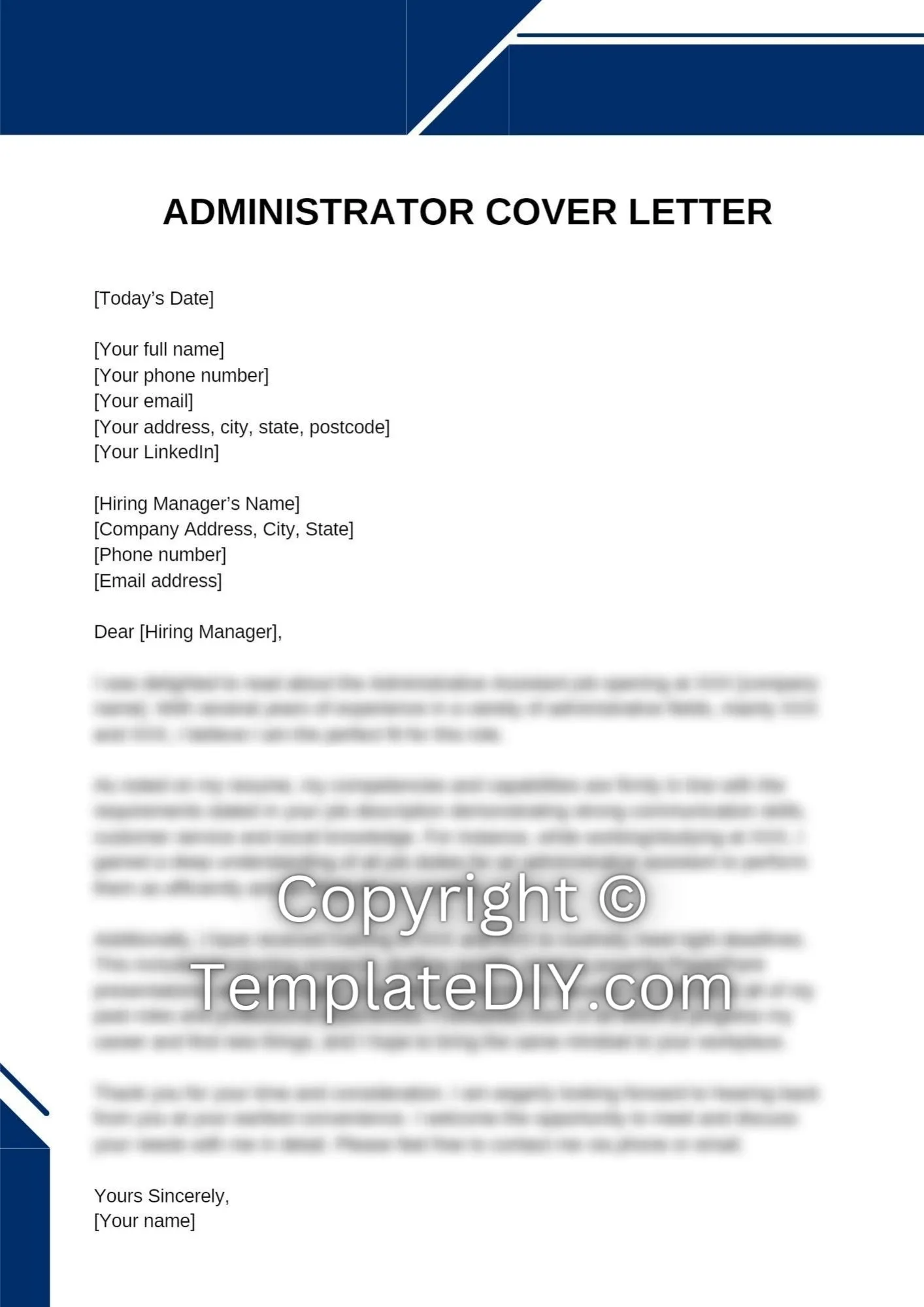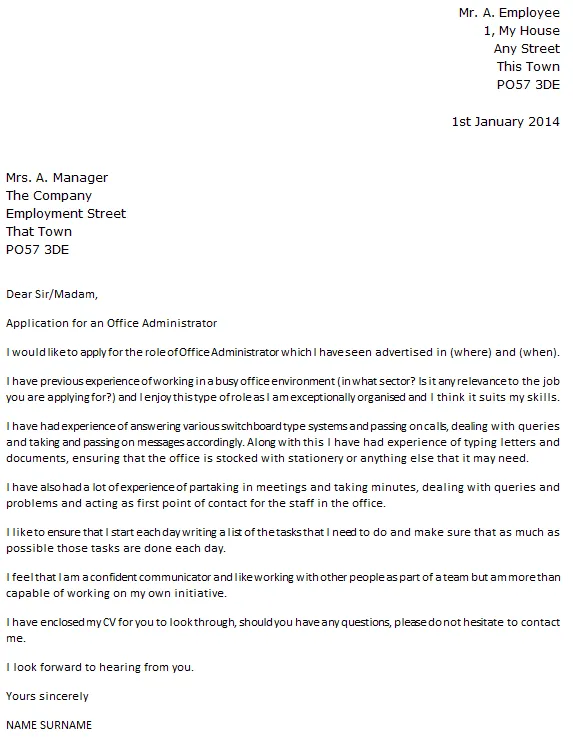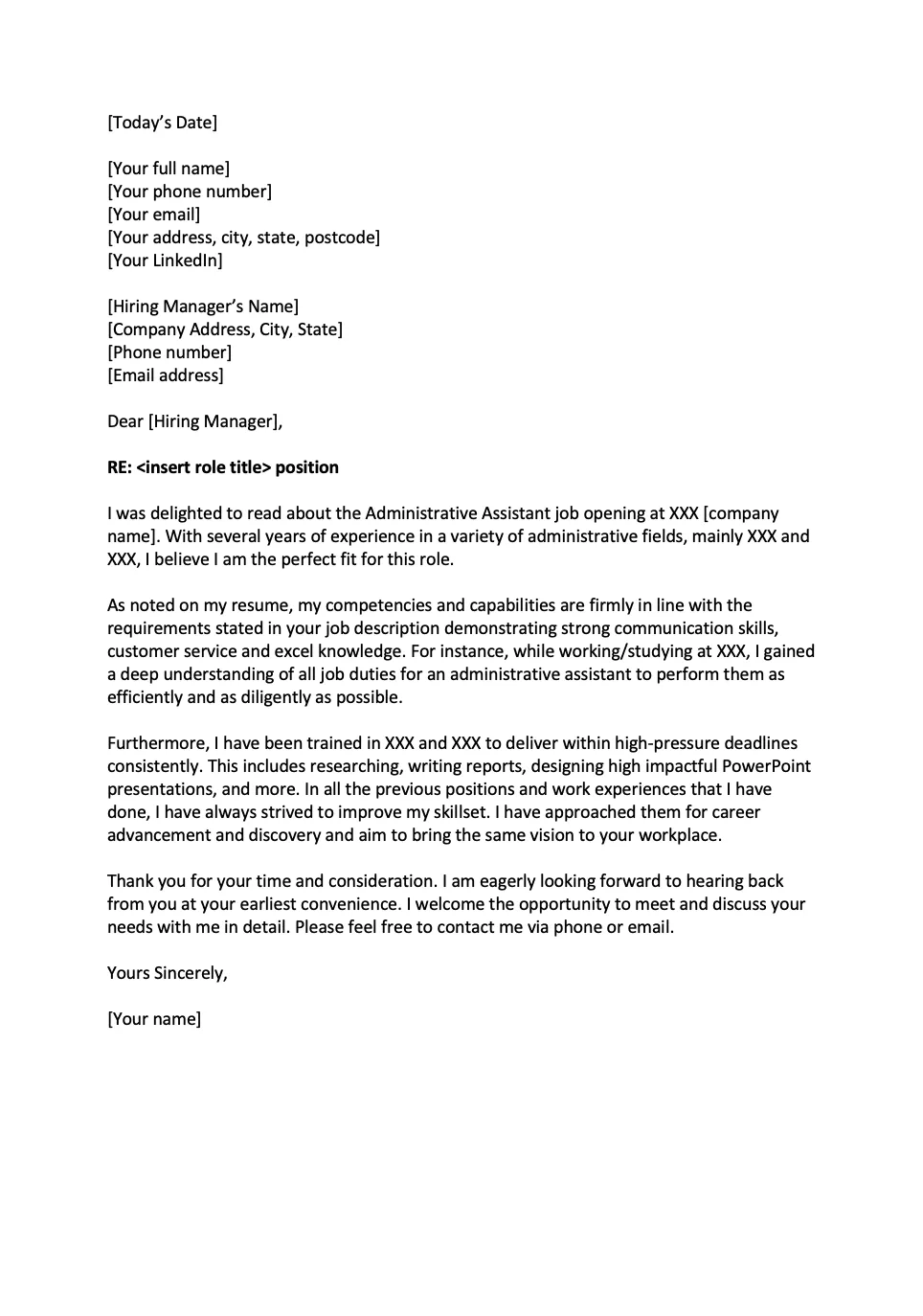Crafting a Cover Letter for Administration
A well-crafted cover letter is your first chance to make a strong impression on a potential employer in the administrative field. It’s not just a formality, but a critical tool to showcase your skills, experience, and personality. The goal is to make a memorable impact, setting you apart from the stack of other applicants. The cover letter allows you to express your enthusiasm for the role and provide context to your resume. It highlights your suitability for the position by connecting your experiences and skills to the job requirements. It’s your opportunity to demonstrate that you’ve researched the company and understand their needs, making your application targeted and relevant. A compelling cover letter increases your chances of getting an interview and ultimately, landing the job.
Highlighting Your Administrative Skills
Administrative roles demand a diverse skill set. Your cover letter is where you should shine a light on those skills. Focus on abilities like organization, time management, communication (both written and verbal), and attention to detail. Consider highlighting your proficiency with specific software and systems such as Microsoft Office Suite, CRM platforms, or project management tools. Describe how you’ve used these skills in previous roles to achieve specific results, like improving efficiency, reducing errors, or enhancing team collaboration. Remember to quantify your achievements whenever possible for example, ‘Streamlined office procedures, reducing paperwork by 20%’ or ‘Managed a calendar for a team of 10, resulting in a 15% increase in meeting efficiency.’ Showcasing your skills effectively is all about demonstrating the value you can bring to the company.
Showcasing Relevant Experience in Administration

Your cover letter should highlight the experiences most relevant to the administrative role you’re applying for. Think of it as a story that connects your background to the requirements of the job. Start by identifying the key responsibilities and qualifications listed in the job description. Then, select specific examples from your professional history that showcase your ability to meet those requirements. Instead of just listing your past job titles and duties, use this space to elaborate on the projects you’ve handled, the challenges you’ve overcome, and the results you’ve achieved. Quantify your impact whenever possible by using data and specific examples. For instance, ‘Successfully managed a complex filing system, reducing retrieval time by 30%’ or ‘Coordinated travel arrangements for a team of 20, saving the company an estimated 10% on travel costs’. This helps the hiring manager visualize you in the role.
Detailing Your Accomplishments
Don’t just describe your duties. Use your cover letter to detail your achievements, the specific things you accomplished in previous roles. Focus on outcomes and the value you brought to previous employers. Think about projects you led, initiatives you spearheaded, or any significant improvements you contributed to. Quantify your accomplishments whenever possible. This might include saving costs, increasing efficiency, improving customer satisfaction, or streamlining processes. For example, instead of saying ‘Managed office supplies’, you could say ‘Managed office supplies, reducing spending by 15% through strategic vendor negotiations’. Highlighting specific achievements proves your ability to make a positive impact and adds credibility to your application. It shows you’re not just doing the job, but excelling at it. Remember to back up your claims with concrete examples, demonstrating your value.
Tailoring Your Cover Letter to the Job Description
Generic cover letters are easily spotted and usually end up in the ‘reject’ pile. Tailoring your cover letter to each job application is essential. Begin by carefully reading the job description. Identify the key skills, experiences, and qualifications the employer is seeking. Then, customize your cover letter to directly address these requirements. Use the same language and keywords that the employer uses in the job posting. Highlight your relevant experiences and skills, providing specific examples of how you’ve used them in the past. Show that you understand the company’s needs and how you can help them achieve their goals. Research the company to understand their culture, values, and recent projects. This shows that you’ve taken the time to learn about them and are genuinely interested in the opportunity. A tailored cover letter demonstrates your genuine interest and increases your chances of securing an interview.
Using Action Verbs Effectively

Action verbs are the backbone of a compelling cover letter. They bring your accomplishments to life and make your statements more impactful. Replace passive descriptions with strong, active verbs that showcase your skills and achievements. Instead of writing ‘Responsible for managing schedules’, use ‘Managed and optimized schedules for a team of 10’. Instead of ‘Assisted with projects’, try ‘Spearheaded project initiatives, resulting in a 10% increase in project completion rates’. Action verbs clearly demonstrate what you did, how you did it, and the results you achieved. They make your cover letter more engaging and help the hiring manager quickly understand your contributions. Examples of strong action verbs include ‘achieved’, ‘managed’, ‘coordinated’, ‘implemented’, ‘developed’, ‘streamlined’, ‘resolved’, ‘improved’, and ‘increased’. Using a variety of action verbs also prevents your writing from becoming monotonous, keeping the reader engaged.
Demonstrating Your Soft Skills
Administrative roles demand a strong set of soft skills. These are the interpersonal and personality traits that enable you to work effectively with others and navigate workplace challenges. Your cover letter is a great place to showcase your soft skills. Highlight your communication skills, both written and verbal. Describe situations where you’ve effectively communicated with colleagues, clients, or superiors. Mention your ability to work collaboratively and build strong relationships. Show how you’ve resolved conflicts, managed difficult situations, or provided exceptional customer service. Demonstrate your organizational skills by describing how you manage multiple tasks, prioritize deadlines, and maintain a structured work environment. Highlight your problem-solving abilities by sharing examples of how you’ve identified and resolved issues. Use examples to support your claims. For example, instead of saying ‘I am a good communicator’, describe how you ‘Successfully mediated a dispute between team members, resulting in improved team morale and productivity’.
Formatting and Structure of Your Cover Letter
The format and structure of your cover letter are as important as its content. A well-formatted letter is easy to read and leaves a professional impression. Start with a clear and concise heading that includes your contact information and the date. Address the letter to the hiring manager by name, if possible. Keep the letter concise, typically no more than one page. Use a professional font, such as Arial or Times New Roman, and a font size between 10 and 12 points. Break up the text with clear paragraphs and sufficient white space. Use a formal tone, but maintain a professional and approachable voice. Proofread your cover letter carefully for any grammatical errors, spelling mistakes, or typos. A polished cover letter shows attention to detail and enhances your credibility. Review your cover letter to ensure it flows logically, with a clear introduction, body, and conclusion. A well-structured cover letter is a powerful tool for making a positive first impression.
In conclusion, a well-crafted cover letter is a critical component of any job application in administration. It allows you to showcase your skills, experience, and personality. By following these tips, you can significantly increase your chances of making a strong impression and landing your dream job.
